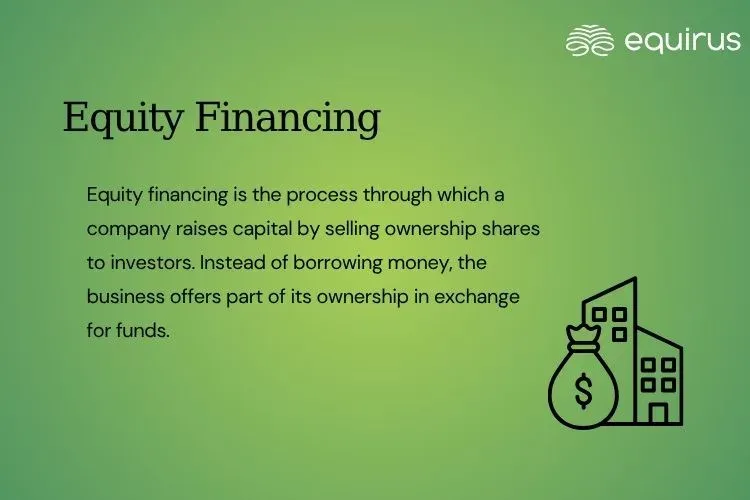Equity Financing

Key Highlights
-
Equity financing is the process through which a company raises capital by selling ownership shares to investors.
-
Types of equity financing includes seed funding, venture capital, private equity, public equity / IPO, follow-on offering.
What is Equity Financing?
Equity financing is the process through which a company raises capital by selling ownership shares to investors. Instead of borrowing money (as in debt financing), the business offers part of its ownership in exchange for funds.
These shares can be issued to:
-
Public investors (via an Initial Public Offering or IPO), or
-
Private investors, such as venture capitalists, angel investors, or private equity firms.
How It Works?
- The company determines how much capital it needs.
- It issues new shares of stock (common or preferred).
- Investors purchase these shares in exchange for ownership and sometimes voting rights.
- The company uses the funds for business activities like expansion, R&D, or debt repayment.
Example
A startup needs ₹10 crore to expand. Instead of taking a loan, it offers 20% of its equity to a venture capital firm in exchange for the money. The firm becomes a partial owner of the company and shares in future profits (and risks).
Types of Equity Financing
| Type | Description |
|---|---|
| Seed Funding | Initial capital raised from founders, friends, family, or angel investors. |
| Venture Capital | Funds from VC firms during early-growth stages. |
| Private Equity | Large investments in mature companies, often for restructuring. |
| Public Equity / IPO | When a company lists on a stock exchange and sells shares to public investors. |
| Follow-on Offering | Additional shares sold by a listed company to raise more funds. |
Benefits of Equity Financing
| Advantage | Explanation |
|---|---|
| No Repayment Obligation | Unlike loans, there’s no pressure to repay investors or pay interest. |
| Shared Risk | If the business fails, investors share the loss. |
| Improved Cash Flow | No regular debt servicing means more flexibility in using funds. |
| Business Support | Investors often bring expertise, networks, and strategic guidance. |
Equity Financing vs. Debt Financing
| Feature | Equity Financing | Debt Financing |
|---|---|---|
| Ownership Dilution | Yes | No |
| Repayment Obligation | No | Yes (with interest) |
| Risk to Business | Shared with investors | Business bears full risk |
| Impact on Cash Flow | Positive | Requires regular payments |
